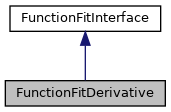#include <fitting.h>
Inheritance diagram for FunctionFitDerivative:

Public Member Functions | |
| FunctionFitDerivative () | |
| ~FunctionFitDerivative () | |
| bool | init (ModelFunction &model_func, unsigned int nvals) |
| bool | fit (const Array< float, 1 > &yvals, const Array< float, 1 > &ysigma=defaultArray, const Array< float, 1 > &xvals=defaultArray, unsigned int max_iterations=DEFAULT_MAX_ITER, double tolerance=DEFAULT_TOLERANCE) |
Detailed Description
Class which is used for derivative-based fitting of functions.
Constructor & Destructor Documentation
◆ FunctionFitDerivative()
|
inline |
◆ ~FunctionFitDerivative()
| FunctionFitDerivative::~FunctionFitDerivative | ( | ) |
Destructor
Member Function Documentation
◆ fit()
|
virtual |
The fitting routine that takes the starting values from the model function, y-values 'yvals', and optionally the corresponding y-error bars 'ysigma' and x-vals 'xvals'. If no error-bars are given, they are all set to 0.1 and if no x-vals are given equidistant points with an increment of one are chosen, i.e. xvals(i)=i; A maximum of 'max_iterations' iterations and the given 'tolerance' is used during the fit. Returns true on success.
Implements FunctionFitInterface.
◆ init()
|
virtual |
Prepare a non-linear least-square fit of function 'model_func' for 'nvals' values
Implements FunctionFitInterface.
The documentation for this class was generated from the following file: